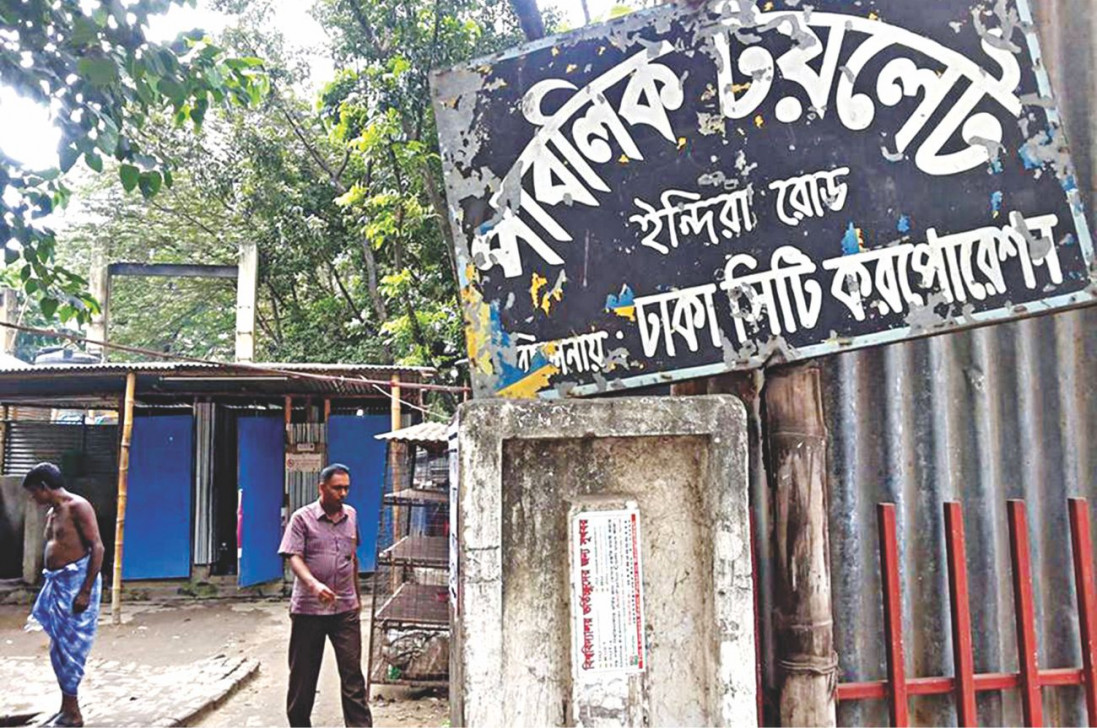Tejgaon's sanitation crisis: A look into workers' health in Dhaka

Tejgaon, one of Dhaka's oldest and busiest industrial zones, is often celebrated as the beating heart of the capital's economy. Its factories, warehouses and offices churn out goods and services round the clock. Yet, behind this story of economic vibrancy lies a stark and shameful paradox: the very workers who keep this industrial hub alive are condemned to live in squalid conditions that rob them of health, dignity and hope.
A recent survey among slum residents in Tejgaon paints a sobering picture of the crisis in water, sanitation and hygiene (WASH). It highlights that without access to safe water and sanitation, urban growth remains not only inequitable but also unsustainable.
The findings reveal that more than half of slum dwellers rely on rudimentary pit latrines, while 38 percent depend on fragile tin structures. Alarmingly, nearly one in ten households resort to makeshift toilets built from cloth and wood. In one of the world's most densely populated cities, such arrangements are not only unhygienic but downright dangerous.
Overcrowding compounds the problem. More than 40 percent of families share a single toilet with three to six households, while another third must share with as many as ten. In some extreme cases, up to 20 families rely on one latrine. Under these circumstances, maintaining basic hygiene is almost impossible.
The consequences are borne disproportionately by women and children. Lack of privacy, exposure to harassment, and heightened risks of infection turn everyday survival into an ordeal. Sanitation, in this context, is not simply about infrastructure; it is about human dignity.
The survey also highlights disturbing lapses in hygiene practices. Only 43 percent of respondents reported using soap consistently after using the toilet. Another 36 percent do so occasionally, while a staggering 20 percent never use soap at all.
This is not merely about awareness; many families simply cannot afford to purchase soap regularly. What may appear to be a minor omission has devastating public health implications. Poor handwashing habits contribute directly to diarrhoeal disease, skin infections and respiratory illness. Children are especially vulnerable, and the resulting malnutrition and absenteeism undermine their education and future prospects.
Access to safe drinking water remains another daily battle. Only 27 percent of respondents reported having personal water sources, while one-third depend on shared supplies. Another 32 percent rely on local tube wells, many of which remain vulnerable to arsenic contamination. A further six percent are forced to buy water, stretching already fragile household budgets.
Even where water is available, consumption patterns reveal a troubling reality: nearly half of residents drink fewer than seven glasses a day, with nine percent consuming fewer than four. Poor quality and inadequate intake leave many exposed to dehydration, gastrointestinal disease and chronic kidney complications.
These failings are not confined to the slums. They spill over into Dhaka's wider economy. Many slum residents work as factory hands, drivers, domestic aides or security guards, integral to the city's daily functioning. Their poor health translates into lower productivity, higher absenteeism and greater healthcare burdens. In other words, unsafe WASH conditions are not just a humanitarian concern; they are an economic liability. A city cannot thrive when the very people who keep it running are locked in a cycle of disease and indignity.
Ensuring safe water and sanitation cannot be left solely to government initiatives. It demands a coordinated effort involving city corporations, NGOs, employers and community groups. Subsidised water supply schemes, community-led sanitation projects and mass awareness campaigns could offer tangible relief. At the same time, urban planning must acknowledge and prioritise the needs of informal workers, rather than relegating them to the margins of industrial prosperity. Outbreaks of waterborne disease, once rooted in slums, do not respect boundaries of class or geography.
If Bangladesh is serious about inclusive growth and sustainable urbanisation, urgent action is needed. Priorities must include investment in safe, affordable and gender-sensitive sanitation facilities; clean, arsenic-free water supplies, backed by subsidised schemes and regular monitoring; expanded hygiene education, particularly in schools and community hubs; and integrating slum populations into urban planning, ensuring that industrial growth is not built upon their neglect.
Dhaka's ambition to be a modern, liveable city hinges on addressing this silent emergency. Progress cannot be measured by skyscrapers and highways alone while the workers who sustain the city remain invisible, trapped in unsafe and degrading conditions.
The WASH crisis in Tejgaon is more than a story of deprivation. It is a litmus test of our collective conscience. Will we continue to overlook the silent suffering of those who sustain us, or will we finally act on the truth that their well-being is inseparable from our own? For reasons of justice, humanity and survival, the choice should be obvious.
Afrin Nur is a pharmacy student at Southeast University. She can be reached at afrinnur2300@gmail.com.
Md Forkan Ahsan is information and public relations officer at Department of Inspection for Factories and Establishments (DIFE). He can be reached at forkanahsan@gmail.com.
Views expressed in this article are the authors' own.
Follow The Daily Star Opinion on Facebook for the latest opinions, commentaries and analyses by experts and professionals. To contribute your article or letter to The Daily Star Opinion, see our guidelines for submission.





 For all latest news, follow The Daily Star's Google News channel.
For all latest news, follow The Daily Star's Google News channel. 

Comments